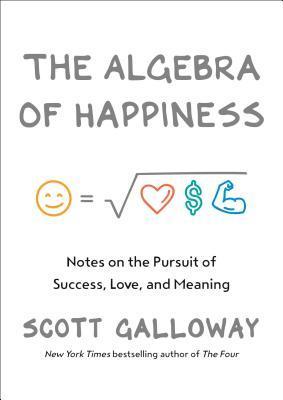Last updated on 2025/05/04
The Algebra Of Happiness Summary
Scott Galloway
Finding fulfillment through the balance of success and joy.
Last updated on 2025/05/04
The Algebra Of Happiness Summary
Scott Galloway
Finding fulfillment through the balance of success and joy.
Description

How many pages in The Algebra Of Happiness?
256 pages
What is the release date for The Algebra Of Happiness?
In "The Algebra of Happiness," Scott Galloway presents a thought-provoking and insightful exploration of the equations that govern our lives, merging the worlds of business acumen and personal fulfillment. Through a unique blend of sharp analysis, personal anecdotes, and humorous observations, Galloway challenges us to rethink what truly contributes to happiness, arguing that it goes beyond mere wealth and success. Instead, he navigates the complex variables of relationships, emotional well-being, and career aspirations, providing a compelling formula for living a satisfying and impactful life. This book invites readers to recalibrate their perspectives on happiness and success, urging us to take meaningful risks and embrace our vulnerabilities as we pursue what genuinely matters.
Author Scott Galloway
Scott Galloway is an accomplished author, entrepreneur, and professor known for his insightful analysis of business and technology trends. He is a clinical professor of marketing at New York University's Stern School of Business, where he teaches students about the complexities and dynamics of the digital economy. Galloway is the founder of several companies, including the digital intelligence firm L2 Inc., and is a prominent public speaker, often sharing his expertise through engaging lectures and media appearances. As a thought leader, he blends academic rigor with practical insights, drawing on his vast experience in both the corporate world and academia to explore themes surrounding success, happiness, and the intersection of personal and professional life in his impactful writing.
The Algebra Of Happiness Summary |Free PDF Download
The Algebra Of Happiness
Chapter 1 | Success
In the first chapter of "The Algebra of Happiness," Scott Galloway shares his reflections on success, exploring various personal experiences that shaped his understanding of achievement and fulfillment in life. One of the central themes is the distinction between talent and the deeper drive of hunger that propels one toward success. While talent can give access to prestigious opportunities, it is rarely sufficient on its own. 1. The Role of Hunger: Galloway contemplates where hunger originates, sharing that it can stem from insecurity and fear. This hunger differentiates between mere success and genuine fulfillment. He recounts his own journey through education, early careers, and his struggles with identity and societal expectations. 2. Finding Fulfillment: His initial pursuit of a prestigious job at Morgan Stanley was driven by the desire to signal success to potential romantic partners. However, the stress and dissatisfaction ultimately taught him that true passion emerges from becoming exceptionally skilled at something. This realization directs him to seek different paths that align with his authentic interests and values. 3. Facing Challenges: Galloway reflects on tough personal experiences, such as his mother's illness, which highlighted the limitations of financial resources. His instinctual response to these challenges was a strong desire for success and security for his family. 4. The Parental Role Reversal: As students graduate and become independent, they often begin to take on responsibilities for their aging parents. Galloway emphasizes that while raising children garners much attention, nurturing one’s parents also brings profound fulfillment and growth. 5. Self-Awareness and Professionalism: Galloway discusses the importance of basic professionalism and respect for others, underscoring the idea that while personal quirks can contribute to one's character, they should not overshadow the fundamental decency expected in professional environments. 6. Navigating Failure: He candidly shares his multiple failures throughout his educational and professional life, emphasizing that rejection is a universal experience. This resonates with the broader lessons drawn from perseverance and the willingness to take risks. 7. Choosing Entrepreneurship Wisely: In articulating the difficult choice between entrepreneurship and traditional employment, Galloway notes that the excitement of startup culture can overshadow the practicality and benefits of stable employment, advocating for a clear-eyed assessment of personal inclinations and skills. 8. Market Awareness and Financial Prudence: As Galloway anticipates economic cycles and possible downturns, he highlights the importance of humility regarding one’s success. He warns against overconfidence during prosperous times and suggests keeping a healthy cash reserve and diversification of investments. 9. Measuring Personal Success: Galloway encourages readers to reflect on their values and what metrics genuinely matter in their lives, such as net worth and relationships, rather than solely career accolades. Understanding one’s personal worth is essential to navigating life’s complexities. 10. The Impact of Kindness: He recalls influential mentors from his past to illustrate the long-term benefits of paying kindness forward. A chance encounter with a supportive figure in his youth significantly impacted his self-worth and ambition, showcasing how attention and validation shape one's trajectory in life. Through these narratives, Galloway weaves a tapestry of personal insights that encourage readers to seek deeper understanding and connection in their pursuits of happiness and success, reflecting on the intricate interplay between ambition, relationships, and self-acceptance.
Key Point: The Role of Hunger
Critical Interpretation: Let Galloway's reflection on the role of hunger inspire you to embrace your own intrinsic drive. Recognize that while talent may open doors, it is your relentless hunger to improve and surpass your own limits that truly fuels your journey to success. This sense of hunger, born from the desire to overcome insecurities and fears, can propel you towards pursuing your passions and honing your skills, leading to genuine fulfillment that goes beyond mere accolades. Let your hunger guide you not just in your career, but in every aspect of life, igniting a fire within you to strive for what truly matters.
Chapter 2 | Love
In "The Algebra of Happiness," Scott Galloway presents a profound exploration of love, relationships, and the meanings we derive from them—essentially arguing that love is not just an emotional attachment but the very essence that underpins our existence and survival as a species. Relationships evolve through different stages, converging on the idea that unconditional love is the ultimate goal, bringing fulfillment and meaning to our lives. 1. Understanding Love: Galloway elaborates on how love operates on different levels. In childhood, we readily receive love from our caregivers. As we mature, we often engage in transactional love, where affection is exchanged for intimacy or support. However, the pinnacle of love is found in the ability to give love unconditionally—a gift that is transformative for both the giver and the recipient, serving to strengthen our connections and affirm our existence. 2. Choosing Your Partner Wisely: The decision about who to have children with is one of the most critical choices in life. The feasibility of a positive, supportive marriage leads to a sense of fulfillment, while pairing with someone incompatible can create distress. The pursuit of relationships should be based on mutual affection rather than perceived status or scarcity mindset. Galloway emphasizes that finding someone who genuinely values and cares for you is vital to personal happiness. 3. The Financial and Emotional Benefits of Partnership: Married couples generally enjoy economic advantages over their single counterparts, including shared resources and enhanced decision-making. Strong partnerships foster environments where both individuals can thrive personally and professionally. Galloway encourages viewing marriage as a commitment that entails both joy and responsibility towards each other. 4. Navigating Parenting and Intimacy: Galloway reflects on parenting truths learned through personal experience. He highlights that familial bonds can sometimes require sacrifices but are ultimately rewarding. Creating intimate and affectionate spaces for children is paramount for their development. Showing love physically and emotionally helps forge strong familial connections—parenting, he believes, is about consistent emotional investment. 5. The Role of Forgiveness: In the fabric of lasting relationships, forgiveness is essential. While it is human nature to keep score in relationships, being generous and letting go of grievances fosters a nurturing environment. Galloway posits that a willingness to accept imperfections in our partners is key to maintaining sustainable unions. 6. Investing in Relationships: Galloway stresses the importance of investing time and effort in both romantic and familial relationships, positing that these are the core components of happiness. Relationships require ongoing engagement, and those who prioritize their loved ones experience deeper connections and long-term satisfaction. 7. Understanding Love Beyond Biology: Love is not solely confined to biological connections; caring for and nurturing children who aren't your own enhances humanity. Acts of kindness, compassion, and care for others enrich life and contribute to societal progress. 8. Perspective on Life and Legacy: Galloway reflects on impending mortality, encouraging readers to focus on building meaningful relationships and legacies. He contrasts material wealth with the richness of love through memories shared, emphasizing the need to cherish experiences and relationships over material acquisitions. 9. Expression of Affection: Galloway advocates for open expressions of love, including physical affection. In a world that can often stifle displays of tenderness, reclaiming these acts becomes paramount for nurturing relationships, strengthening bonds, and ensuring that feelings are communicated effectively. 10. Final Thoughts on Happiness: Ultimately, Galloway articulates that happiness is achieved through love—specifically, through the love we give and receive. As we connect with others in meaningful ways, we create a life rich in joy, fulfillment, and purpose. Recognizing the finite nature of our time together serves to amplify the importance of love, urging us to cherish our relationships and prioritize connection as the essence of human existence. In essence, Galloway's work is a compelling reminder of the significance of love in shaping our lives and legacies, encouraging a focus on the relationships that truly matter. The interplay between love, happiness, and fulfillment presents a profound narrative about the human experience.
Key Point: Understanding Love as the Essence of Existence
Critical Interpretation: Imagine waking up each day with the awareness that the love you give and receive is the true essence of your existence. In Galloway's words, unconditional love becomes your ultimate goal, a transformative force that can strengthen your connections with those around you. As you navigate life, uncover the different levels of love—from the carefree affection of childhood to the deeper, unconditional bonds you strive for in adulthood. Embrace the idea that every act of love is a building block to a fulfilling life; make it your mission to practice giving love freely, fostering deeper relationships, and experiencing the rich tapestry of human connection that not only affirms your existence but profoundly enhances your happiness.
Chapter 3 | Health
In "The Algebra of Happiness," Scott Galloway reflects on various aspects of health, emotional well-being, and personal growth, particularly as they relate to aging and relationships. He emphasizes a philosophy of physical strength complemented by emotional resilience, underlining the importance of activity and relationships in living a fulfilling life. 1. Physical and Mental Strength: Galloway discusses how a strong physical presence can instill confidence, especially in professional settings. Regular physical exercise, even in the form of demanding work hours, contributes to mental toughness. He uses the metaphor of the "hunter-gatherer" to underline the human inclination toward movement and social interaction, which are fundamental to happiness. 2. Emotional Awareness: As he ages, Galloway becomes more aware of his emotional and physical reactions to stress. Stress management evolves into recognizing what truly matters in life, enabling him to separate trivial concerns from significant issues. He recounts experiences that demonstrate the heightened sensitivity to stress as he grows older, such as feeling overwhelmed before public speaking engagements. 3. Vulnerability and Crying: The author reflects on vulnerability and emotional expressions like crying, showing that it can serve as a release mechanism for stress and sadness. He shares personal stories about his emotional experiences, suggesting that crying can lead to deeper connections and understanding of oneself. 4. Family Dynamics: Galloway describes his relationship with his family as harmonious yet distant. He values the lack of drama in these relationships over constant closeness, as they contribute to a supportive, low-maintenance connection that fosters mutual respect and enjoyment. 5. Caregiving: He emphasizes the long-term health benefits of caregiving, sharing experiences as a caregiver to his aging father. This role has illuminated the importance of being actively involved in the lives of loved ones, highlighting feelings of purpose and connection that accompany caregiving. 6. Living in the Moment: The concept of appreciating the present is central to Galloway's reflections. He discusses the tension between striving for future success and the need to engage deeply with life as it unfolds. Experiencing joy in small moments, such as enjoying time with his children, becomes a vital counterbalance to the demands of work and stress. 7. Authenticity and Gratitude: Galloway recognizes how authenticity can liberate relationships, allowing for genuine interactions despite the complexities of adult life. He emphasizes the power of gratitude and praise in fostering meaningful connections with others and enhancing personal happiness. 8. Healthy Addictions: Lastly, he draws a parallel between parenting and addictive behaviors, illustrating how the emotional highs from loving one's children can mirror addiction, yet reinforces the idea that real sustenance comes from consistent love and support rather than fleeting rewards. Galloway’s reflections culminate in a holistic view of happiness that encompasses physical health, emotional intelligence, strong relationships, and a deliberate focus on being present, framing this as essential to a fulfilling life as one navigates the complexities of aging and personal identity.
Key Point: Physical and Mental Strength
Critical Interpretation: Imagine how transformative it would be for your life if you embraced the idea that physical strength and mental resilience are intertwined. By committing to regular exercise and staying active, you not only boost your physical well-being but also cultivate a powerful sense of confidence that spills over into your professional and personal interactions. As you draw inspiration from Galloway’s metaphor of the 'hunter-gatherer,' consider how movement and social connection are embedded in your very nature. Each step you take toward stronger health could unlock not just a more energetic existence but a more fulfilled and balanced you, where the vigor of your body fuels the clarity of your mind, leading you to navigate life's challenges with newfound strength and determination.
Chapter 4 | Epilogue
In reflecting on personal relationships and the true meaning of success, Scott Galloway shares poignant anecdotes from his past, exploring the lives of those who were once perceived as exemplary representations of success and happiness. Among these individuals were Karsen and Charly Evans, friends of Galloway's mother, who initially seemed to embody the ideals of wealth and social status. Karsen, a strikingly beautiful woman, and her husband Charly enjoyed a lifestyle filled with luxury and excitement, hosting lively parties that attracted a captivating crowd. This early exposure to their world left a significant impression on Galloway, associating prosperity with joy. However, as time unfolded, the fragility of their perceived happiness became evident. Charly’s ambitious venture into technology ultimately led to financial ruin, resulting in a cascade of personal tragedies. He struggled with depression—a term that was largely absent in the lexicon of their time—culminating in his tragic suicide. Karsen, left to cope with her own challenges, fell into opioid addiction and continued to grapple with the loss of her partner. Their lives, once filled with light, were overshadowed by darkness, revealing the harsh truth that wealth and social standing do not equate to lasting fulfillment or emotional stability. Galloway’s narrative reminds us that relationships are quintessential to our well-being. Despite the deaths of Karsen and Charly—both of whom ended their lives feeling isolated—he underscores the importance of nurtured connections. His own negligence in maintaining contact with Karsen after his mother's passing evokes a sense of regret, highlighting how easily we can become absorbed in our own lives at the expense of those who care for us. Through reflections on his inheritance of Karsen's gold coins, Galloway contemplates the fragility of material success and its fleeting nature. He realizes that the true value of life extends beyond possessions; it lies in the bonds forged with others. This epiphany propels him to reassess his priorities, recognizing that in the end, relationships are paramount, serving as the foundation for both personal fulfillment and lasting legacy. In essence, Galloway's journey illustrates that while professional achievements and wealth may provide temporary satisfaction, the richness of life is ultimately measured by the depth of our connections with others. He emphasizes the necessity of investing in these relationships, as they are the elements that truly define our existence and bring genuine joy and meaning.







